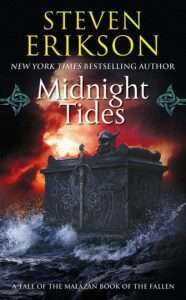REVIEW: Midnight Tides by Steven Erikson
Steven Erikson’s Midnight Tides is a book that starts with a sigh and ends with tears. Philosophical as ever, Erikson’s fifth entry in Malazan: Book of the Fallen takes us to a new continent with a new batch of characters. Through brilliant dialogue and awe-inspiring world-building, Midnight Tides stands as one of the best novels in Malazan, meaning that it stands as one of the best novels in fantasy as a genre.
“We have a talent for disguising greed under the cloak of freedom. As for past acts of depravity, we prefer to ignore those. Progress, after all, means to look ever forward, and whatever we have trampled in our wake is best forgotten.”
Erikson has always asked for a lot from his readers. There has to be a willingness to subject yourself to confusion, to mystery. He asks that you put your faith in him, or, as his fans says “RAFO” (Read And Find Out). While it’s true that his novels use complexity to the highest extent, Erikson always delivers the reader to dazzling climaxes and a feeling of wonder.
Midnight Tides is the most on-brand example.
Between the first four tales of Malazan, we’ve alternated between two continents, thousands of characters, and a world we are only beginning to get a larger understanding of. Erikson then says “we’ll come back to all of that” and introduces yet another continent, complete with its own religious systems, economy, factions, characters, and everything else. Erikson’s master of anthropology and civilization truly shines here, and the world we’re shown here is rife with cool-yet-human concepts and harsh critiques.
Malazan does not have a true main character. You can, however, make arguments that certain books have main characters (Gardens of the Moon & Ganoes Paran; House of Chains & Karsa Orlong) and Midnight Tides’ candidate for main character would be none other than Tehol Beddict.
Tehol is one of the most charming characters I’ve ever seen.
Midnight Tides, despite its darkness, has a certain breath of clever levity that Tehol breathes into the narrative, and I found myself constantly wanting more of him and his man-servant, Bugg. While the side characters in this novel are absolutely brilliant, Tehol (and Bugg, of course) carry the novel.
I don’t want to merely gloss over the side characters in Midnight Tides, only to stress the level of importance, and lovability, of Tehol Beddict. With that underlined and highlighted, I have to give an equally excited shout out to the rest of the cast. Rhulad, Brys, Udinaas, Trull … it’s incredible the amount of character work Erikson weaves into Midnight Tides while building a truly complex and layered society.
“Money’s just an idea, it has power. Only it’s not real power. Just the promise of power. But that promise is enough so long as everyone keeps pretending it’s real. Stop pretending and it all falls apart.”
The core plot took a little while for me to buy into. It’s dark, it’s a critique on society, it’s familiar yet totally foreign. We don’t have the characters we’ve come to grow and love, and it feels like we’ve been dropped off at an after-school daycare instead of being in the home we know and love.
There’s two main driving factions: one with Letheras, a capitalistic society, and one with the changing leadership of the Tiste Edur after certain events force a new ruler. Of course, Erikson’s side characters have their own motivations and gods run amok in the converging chaos, but the bulk of Midnight Tides hinges upon those two societies and how they react to changing landscapes. There is a certain slowness to buy in, but I don’t know if that hesitancy is a personal issue or a structural one. Ultimately, it doesn’t matter, as it’s something that was overcome and washed away, like the tides. I apologize for this pun/metaphor.
“Oh, we talk of progress, but what we really desire is the perpetuation of the present. With its seemingly endless excesses, its ravenous appetites. Ever the same rules, ever the same game.”
All in all, Midnight Tides is one of Erikson’s best works. I cannot overstate the skill demonstrated in the dialogue and the character work. The action is scintillating, and the ending … tragic, yet incredible.
If you’re reading this review because you didn’t love House of Chains, I am telling you to put your trust in Erikson and embark on this journey.
P.S. Check out Marc Simonetti’s version of Midnight Tides–unbelievably gorgeous cover.
Read Midnight Tides by Steven Erikson
The post REVIEW: Midnight Tides by Steven Erikson appeared first on Grimdark Magazine.




